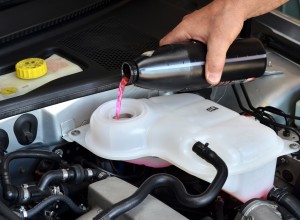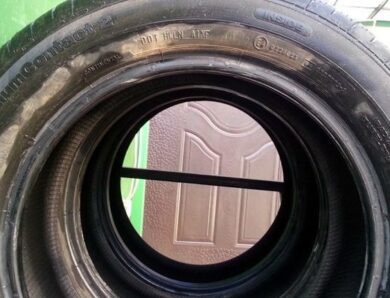Flushing the engine cooling system with your own hands
During operation and maintenance of the internal combustion engine it is obligatory to periodically replace working technical liquids.. These include engine oil transmission oil in the gearbox, brake fluid and coolant fluid. Prior to replacement, in some cases, pre-flushing of these systems and units is required.
We also recommend reading the article about it, whether to use engine flushing before changing the oil. In this article you will learn about it, when it is necessary and when it is not necessary to wash out the engine.
Flushing the engine cooling system and replacing the coolant (OS) is a responsible procedure, which is desirable to spend at least 1 once on 2-3 years or every 70-80 thousand. km. mileage, which will depend on the quality of the poured liquid in the cooling system. The counteraction of motor overheating directly depends on the normal operation of the engine cooling system and the quality of the coolant, efficiency of maintenance of working temperature of the engine under any conditions and operating modes of the engine, car radiator life, heating radiator, water pump (pumps) and connecting pipes
When and why you need to change the antifreeze
Let's start with that, that water is practically not used in the cooling system today, giving way to antifreeze or antifreeze. One of the properties of the working fluid in the system, regardless of type (antifreeze or antifreeze) there is a tendency to gradual boiling.
In other words, the level in the expansion tank is gradually falling. In this case, most motorists add ordinary distilled water, since the coolant itself is a concentrate, which is dissolved in a certain proportion with distilled water. Let's add, what a liquid (provided good quality of the concentrate and distilled water) performs two functions at once:
- The main task is to remove heat from the engine and transfer heat to the radiator, where further cooling takes place circulating coolant;
- An additional function is protection, cleaning and partial lubrication of internal surfaces and elements of the cooling system;
Due to the significant heating and boiling of the coolant, which requires periodic dilution with water, as well as for a number of other reasons there is a gradual loss of coolant properties. so, the service life of such working fluid is limited. The result is the need to replace it. There is also the fact of the formation of scale and dirt in the cooling system. For this reason, there is a noticeable change in color (darkening) and the smell of antifreeze, indicating the end of the coolant life and / or contamination of the cooling system.
Given the above, it is necessary not only to periodically change the fluid in the cooling system, but also flush the engine cooling system before replacing the coolant. Ignoring this rule leads to that, that fresh antifreeze or antifreeze darkens or even turns black after a few tens of kilometers, as it is poured into a dirty cooling system. Let's add, that the contaminated system cannot function properly even when the coolant replacement is taken into account.
How to rinse and clean the engine cooling system yourself
Let's start with that, that the cleaning of the cooling system involves the division into two stages. The first includes the external cleaning of the radiator cells and the fan of the cooling system from dust, down, dirt and other debris. For cleaning it will be enough to use any damp cloth, which you can wipe the fan blades. As for the radiator, its cells are washed with a jet of water directed under low pressure. pay attention, Kercher-type high-pressure washing can damage the soft cells of a car radiator.
We also recommend reading the article about it, how to properly wash the engine and whether to do it with Kercher. In this article you will learn about the features of self-washing under the hood space and power unit with high pressure devices, as well as other available methods.
Now let's move on to the so-called internal cleansing, ie directly before flushing the cooling system. This system must be flushed to remove scale and rust, as well as sediments, which inevitably occur after the decomposition of additives in the antifreeze / antifreeze. In engines, which have certain faults, engine oil or gases from the combustion chamber may additionally enter the cooling system, which also negatively affects the overall state of the system.
Such washing is carried out by means of various special means, solutions or water (as usual, and distilled). Each of the cleaners used has certain advantages and disadvantages, which we'll talk about later.
It is necessary to begin washing with drain of old antifreeze from system by unscrewing of a drain stopper on a radiator, which is structurally located at the bottom. You also need to unscrew the drain plug on the cylinder block (in the presence) to remove coolant residues from the engine cooling jacket. To drain, unscrew the expansion tank cover, put containers under the radiator and BC, unscrew the drain plugs.
Remember, unscrew the upper or lower radiator cap, traffic jam on BC, as well as the expansion tank cover on a hot engine is prohibited! Increased pressure is formed in the system, as a result, the liquid can spill out and cause serious burns and other injuries!
The further washing process is extremely simple:
- after draining all plugs are screwed. Then water or a special washing liquid is poured into the system through the expansion tank.
- then the engine is idling for approx 10-15 minutes (until then, until the motor is completely at operating temperature and the cooling fan is turned on).
Deviations in the process of heating the engine to operating temperature may indicate the presence of the formed air plug. Such a plug must be removed by idling or disconnecting the nozzles to further pump the system on the started engine.
pay attention, the fan may turn on unexpectedly. Do not allow foreign objects to be found in the bonnet space, which can get into the fan. This will break it. Also protect the limbs from being hit by the cooling fan blades!
After reaching the operating temperature of the engine is allowed to cool, then the liquid is drained again as described above. Do not forget, that during washing the stove in the cabin should be turned on for maximum heating. This allows you to flush the heater radiator, which is also circulating coolant. The end of washing can be considered a moment, when clean flushing liquid or water will flow out of the cooling system after the next drain.
Why the cooling system is polluted: main reasons
The main reason for the rapid contamination of the cooling system is the use of ordinary running water, as water in the cooling system causes abundant formation of scale and rust. Simple water also contains a large amount of salts, which in conditions of high temperatures settle on the inner surfaces of the cooling system. As for distilled water, scale as a result of its use is less, but it is still not able to provide adequate protection against corrosion.
Pouring into the cooling system of quality antifreeze or antifreeze does not lead to the formation of scale and slows down corrosion processes. At the same time antifreeze after some time loses its protective properties, additives in its composition cease to operate. As a result, precipitation may occur, decomposition products accumulate on the walls of the pipes and on the inner surfaces of the elements of the cooling system. The overall efficiency of the system is reduced, in some cases, highways may be blocked.
What and how best to flush the engine cooling system
Let's start with that, that examples with the use of the popular Coca-Cola drink for flushing the radiator and engine cooling system, we will not consider. Let's focus on common decisions:
- ordinary or distilled water, water with oxidizer;
- special engine cooling system cleaners;
As for running water, this method of washing is the least effective, and can cause additional scale formation. It is better to boil beforehand 10-15 liters of water, and then pour boiled water into the system. A more gentle option is to use distilled water, which is sold at gas stations or in large hypermarkets. Some motorists also prefer to use distilled water from a pharmacy, referring to the best quality.
In any case, the effectiveness of rinsing with water will be low and suitable only for relatively clean systems, as boiling water is not able to remove most of the contaminants. If scale is found in the drained coolant or water after rinsing, and there are no special cleaners on hand, then it is better to wash away such deposits by means of acidified water. You will need a weak solution to solve the problem, which must consist of water, to which caustic soda is added at choice, vinegar or lactic acid.
The solution should not be too active, that is, you need to add a moderate amount of acid to the water. Otherwise, there is a risk of damaging the rubber and plastic elements. This solution is poured into the cooling system and involves staying in the circuit for several hours (from 4 to 7), depending on the degree of contamination.
The first 2-3 hours the motor with the filled structure needs to be warmed up at idle to working temperatures, then muffle and wait to cool. It is necessary, so that the heated acid solution remained in the system for at least 3 hours. Then the solution is drained, a new one is poured in and the procedure is repeated. Completion of cleaning can be considered a drain of the solution, then the final rinsing with distilled water is mandatory.
The most effective way to clean the engine cooling system from dirt is to purchase special tools. Acids are required to remove scale, alkaline solution is required for organic compounds and fats. Under normal conditions, acid-base solution can not be made, since acid and alkali are not compatible and neutralize each other. Alkalis and acids also affect various elements in the system, which are made of rubber and plastic.
Taking into account these features in the sale of alkaline and acidic compositions are rather poorly represented, as the risk of negative consequences is very high. The main reason is the increased aggressiveness towards rubber and plastic, and the need to neutralize and thoroughly flush the system after the use of such tools.
Against this background, the so-called two-component cleaners of the engine cooling system are more popular. There are two warehouses in the package, alkaline and acidic. These compositions are alternately poured into the radiator or tank. Also included is a neutralizer flushing fluid.
Neutral cleaners are the most expensive. Such funds exclude negative consequences, which occur after the use of water, acids and alkalis, comprehensively combat various types of pollution in the system: scale, organic deposits and fats. They can be used for prevention in the next replacement of antifreeze, and to remove heavy contaminants.
Such cleaning agents are included:
- active detergents for complex removal of contaminants;
- dispersant packages, which do not allow previously washed from the walls of the deposits to re-adhere to surfaces and parts;
- means for protection of rubber and plastic elements of cooling system from influence of acids and alkalis on them;
- anti-corrosion components;
Finally, let's add, that the replacement of antifreeze should be treated with the same care, as well as to the question of changing the engine oil. Only timely replacement of coolant and use of high-quality coolant will keep the liquid engine cooling system in good condition and clean..




